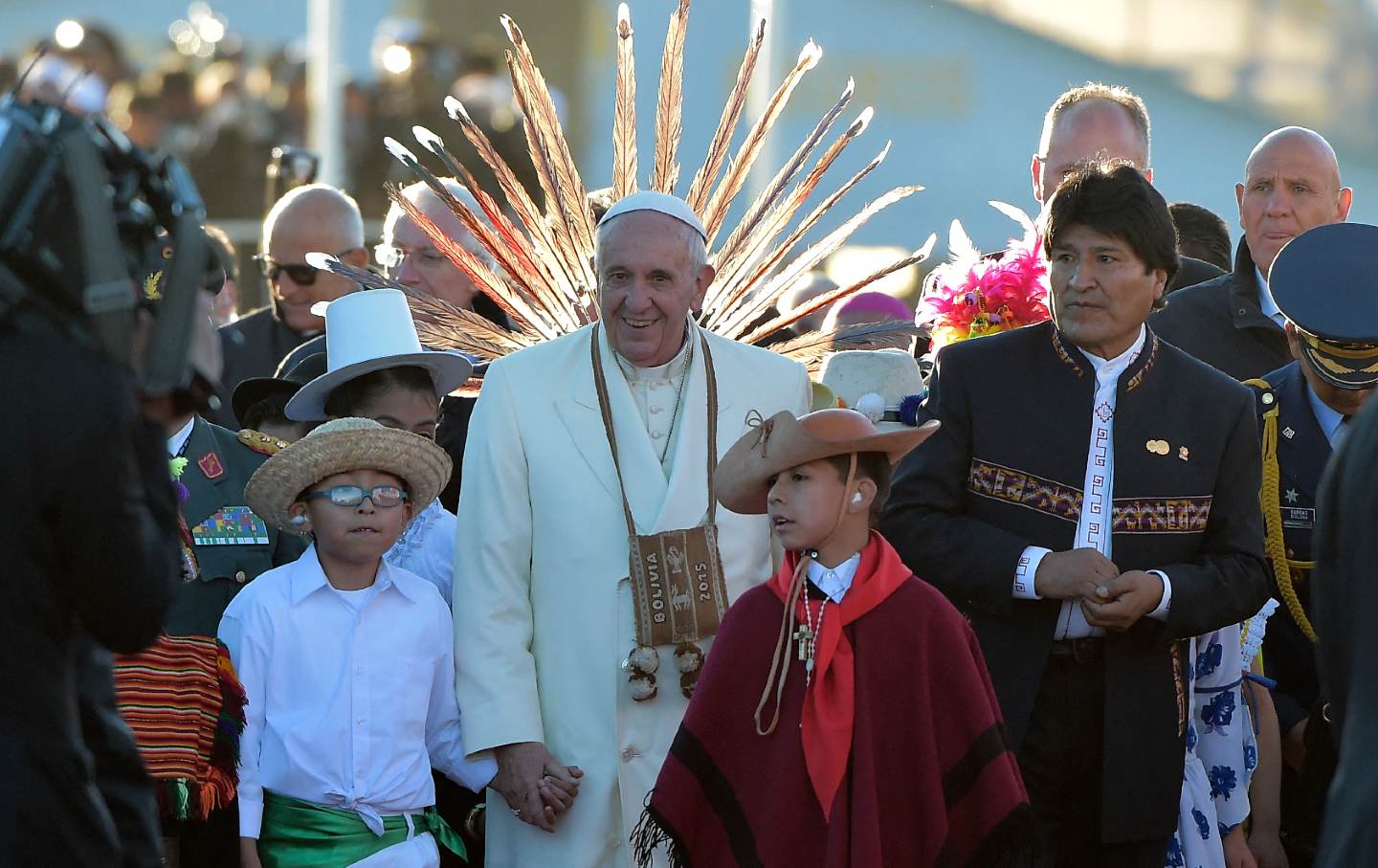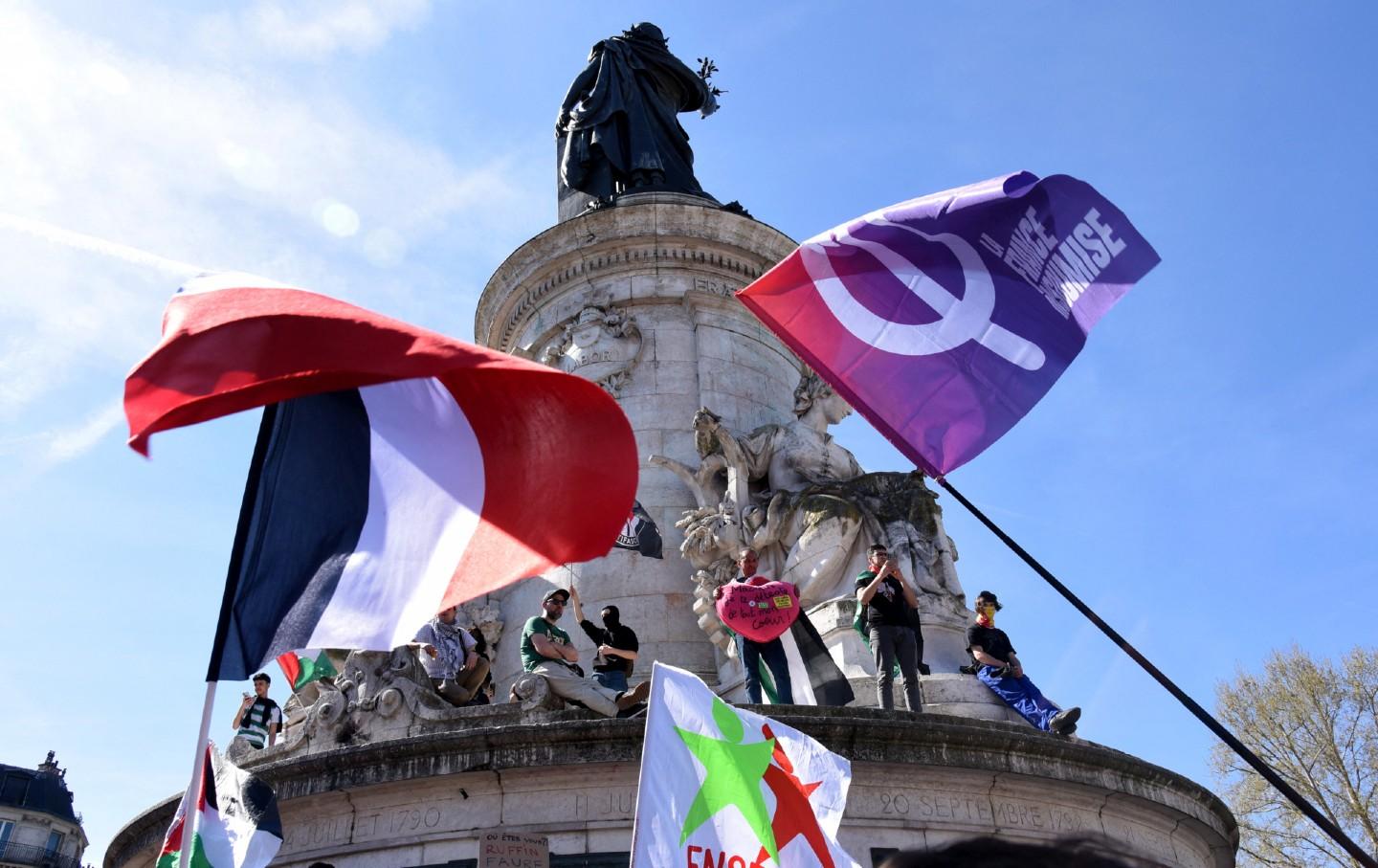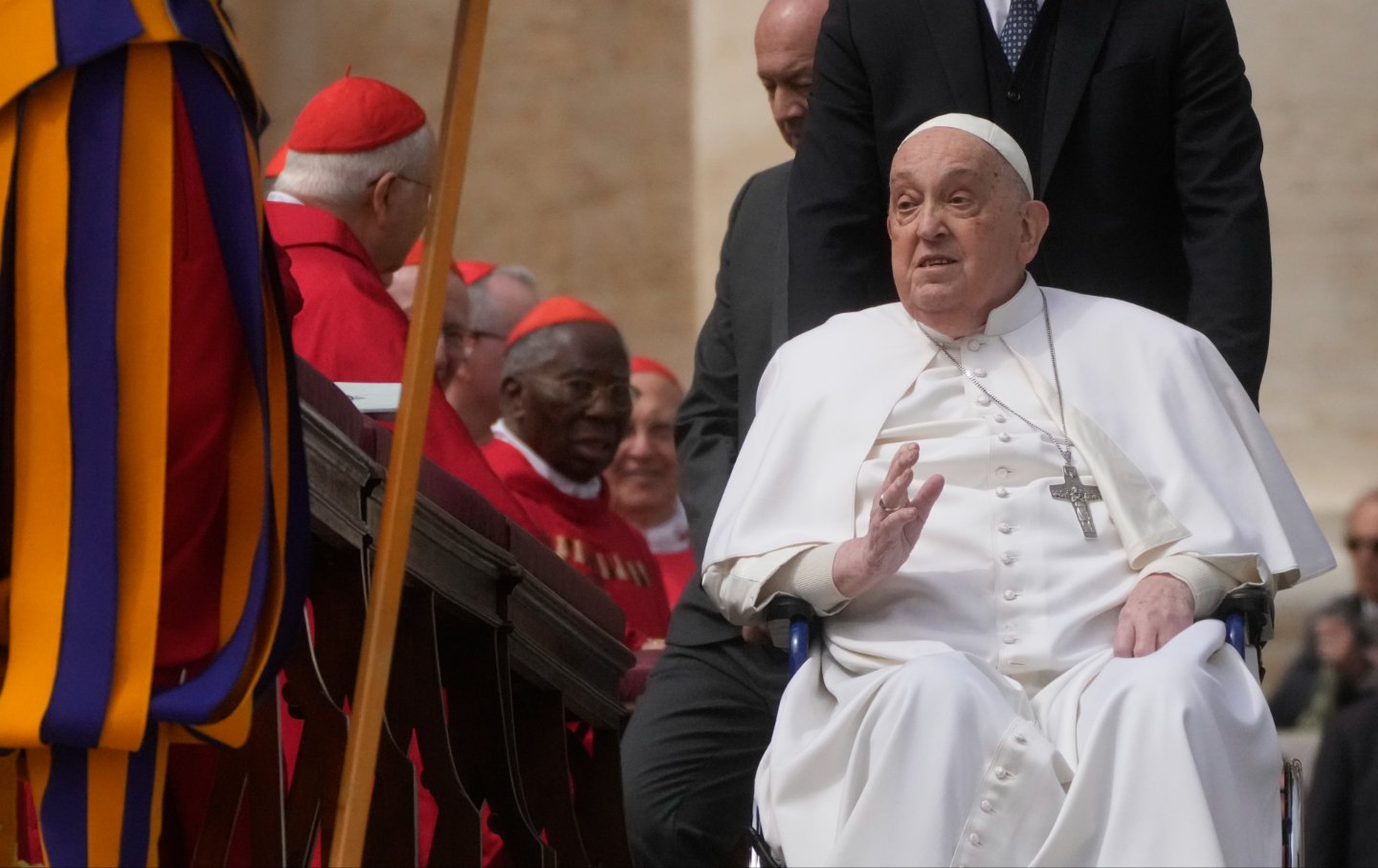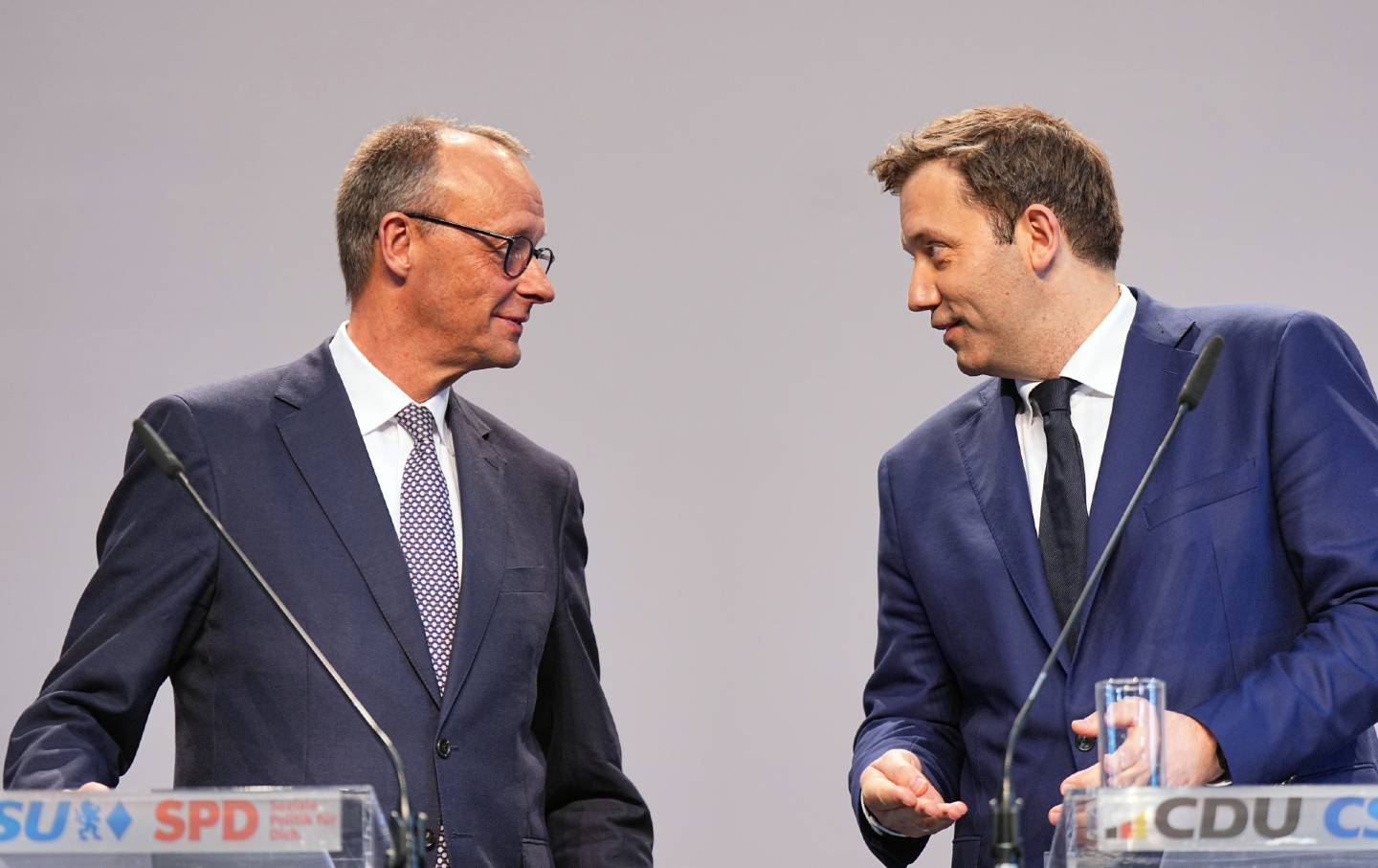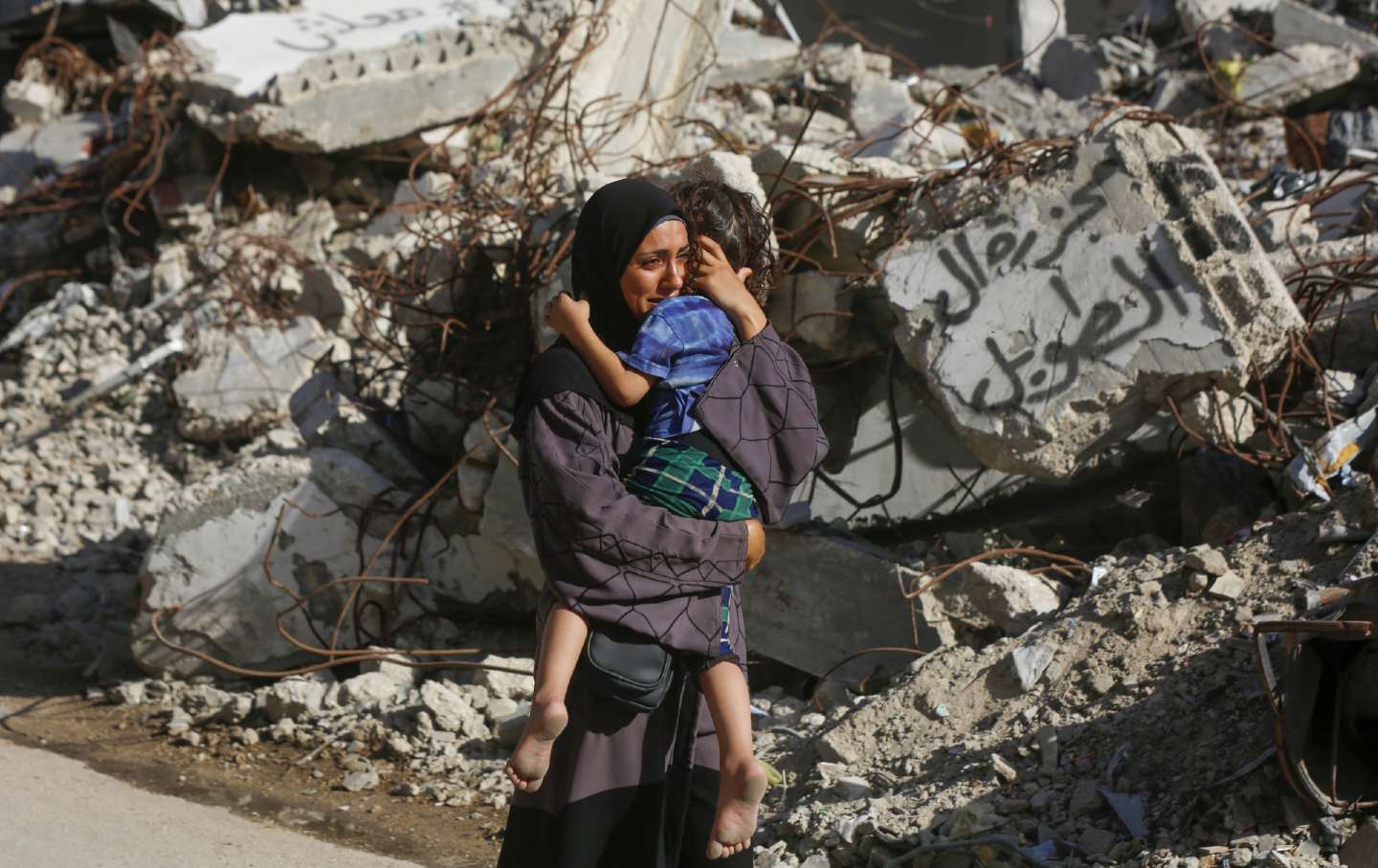The Uses and Abuses of Language in Israel’s War on Palestinians
Israel and its allies have deliberately crafted language not only to justify their actions but also to persuade taxpaying publics at home and abroad of their moral correctness.
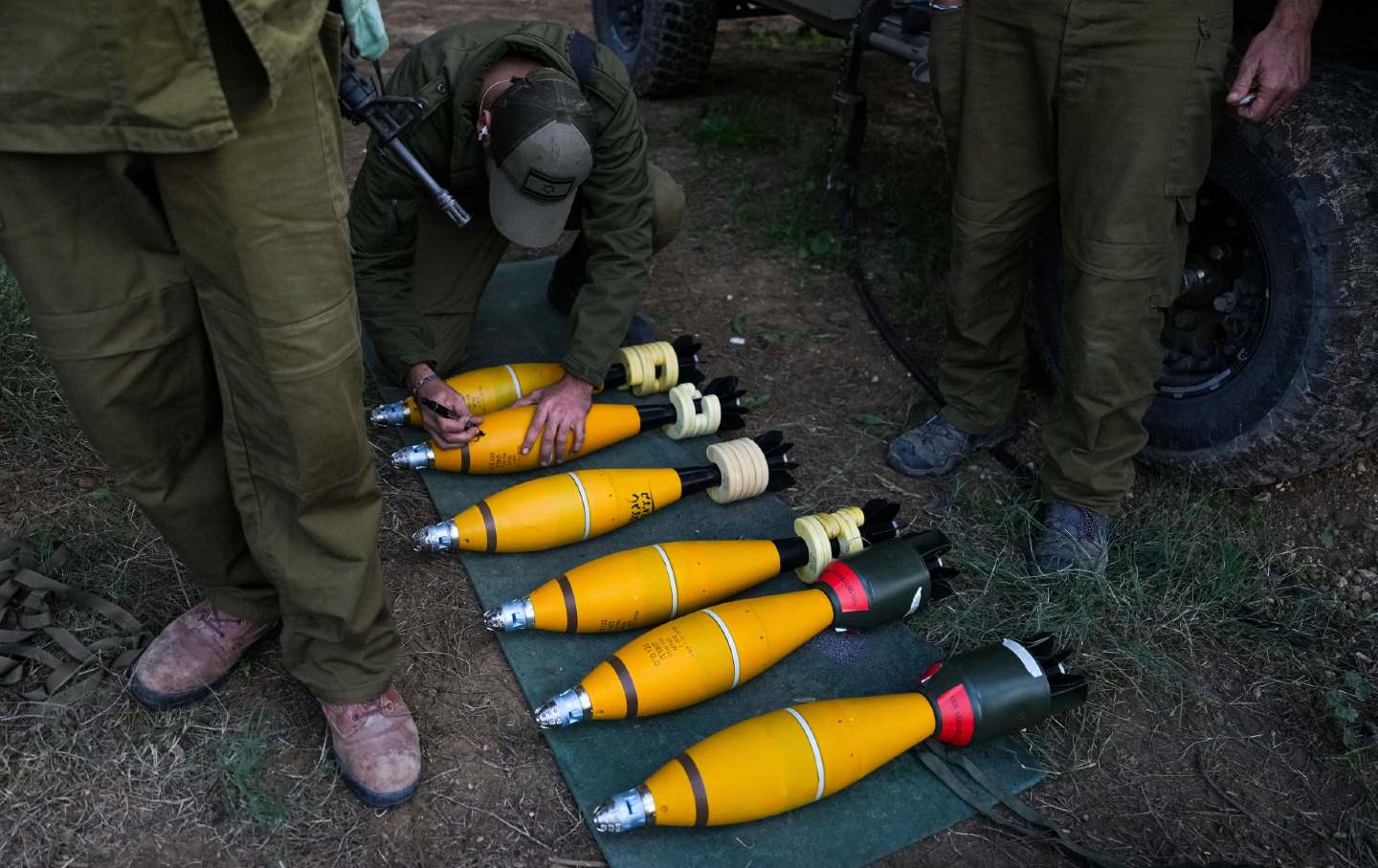
An Israeli soldier writes on a mortar near the Israel-Gaza border on December 20, 2023.
(Tsafrir Abayov / AP Photo)All colonial projects are supported by perversions of language. From American expansion into the “Wild West” to European colonization of African “savages,” deliberately crafted euphemisms have gone hand in hand with the will to dominate foreign populations and appropriate lands and resources. Modern colonial and imperial powers have used such language not only to justify their enterprises but also to persuade the taxpaying public of their moral correctness. Walter Lippman, and Noam Chomsky after him, called this the “manufacture of consent,” but the public relations industry calls it, a little more gently, the “engineering of consent.”
Until the 1960s and the first wave of successful anti-colonial independence movements, Zionists were not ashamed to call their project colonialism. Established with the aim of creating a Jewish homeland in Palestine, their institutions from 1897 onward included the Jewish Colonization Association, the Society for the Colonization of the Land of Israel, the Palestine Jewish Colonization Association, and the Jewish Colonial Trust. Today, Zionists who resist the description of Israel as a settler colony invoke “complexity,” but before the founding of the Israeli state in 1948—which drove 750,000 Palestinians from their homes—the words “colonial” and “colonization” were the consensus terms used by European countries like Britain, France, Belgium, Spain, and Italy to describe their settlement and control of foreign territories, and they were the words Zionists used to describe theirs.
In contrast to other forms of colonialism that rely on labor exploitation, settler colonialism seeks land without its preexisting inhabitants: In the Australian historian Patrick Wolfe’s words, settler colonialism “destroys to replace.” A common counterargument to the colonial framework invokes indigenousness—that Jews have always lived in Palestine—but there is a clear difference between occupancy and dominion, or, indeed, domination.
Unlike other settler-colonial societies—French Algeria or British Kenya and Australia, for example—the Israeli state project is seen by its defenders as unique because there is no metropole. This is debatable. Initial support for the Zionist aspiration to a state in the Middle East came from the British empire, which pledged to support Zionist settlement in 1917 and relinquished mandatory Palestine in favor of a “Jewish homeland” in May 1948. Since then, according to USAID data, US assistance to Israel—overwhelmingly military—has amounted to more than $260 billion, adjusted for inflation and not counting the $14.3 billion in military aid promised by President Joe Biden in November; the United States also supports Israel’s free healthcare system.
The United States is not the only country where, since last October, calling for a cease-fire in Gaza gets you sacked, as happened to David Velasco, who lost his as job as editor in chief of Artforum, or accused of antisemitism or of being a terrorist or terrorist sympathizer. Chanting “Stop the genocide” is now illegal in Berlin. When Paul Bristow, a UK ministerial aide, spoke in favor of a cease-fire, he was fired. When UN Secretary General António Guterres did so, Israel’s ambassador Gilad Erdan accused him of having “an understanding for terrorism and murder” and declared that no Israeli visas would be issued to UN officials. The Arabic word intifada—literally, shaking off, first used among Palestinians describe their largely nonviolent uprising of 1987—is now being mistranslated as “genocide of Jews.” After failing to condemn use of the word during a congressional hearing, Liz Magill, the president of the University of Pennsylvania, was forced to resign. The president of Harvard is also facing pressure to step down. Meanwhile, according to many Holocaust and genocide experts, an actual genocide may be underway in Gaza. The linking of the words “cease-fire” and “terrorism” is part of an assault on language that has implications for everyone, and carries the war waged against Palestinians well beyond historic Palestine.
In the early Zionist imagination, Palestine was an empty land waiting for Jewish “pioneers” to “drain the swamps” and “make the desert bloom.” Zionists depicted Palestinians as “primitive,” “dishonest,” and “lazy”—similar to native populations in the eyes of European colonizers elsewhere. Biblically loaded imagery of “redeeming” or “reclaiming the land” based on ancient claims also echoes the discourse of the American settler movement, impelled by Manifest Destiny and a sense of God-given rights. The Balfour Declaration spoke of the Palestinians—the overwhelming majority in Palestine—as “non-Jewish communities.” It was one of the first shots in the war of discourse against the Palestinians, identifying them not by their status as independent people living on their land, but by their status as non-Jews.
Later, Zionism produced an array of ideological and legalistic terms invoking ancient claims to the land—“Ingathering of the Exiles,” for instance, or the more juridical “Law of Return.” The conquest and expulsion of three-quarters of the country’s Palestinian inhabitants in the 1948–49— known as the Nakba, or “catastrophe” in Arabic—is described as “liberating” Palestine from its inhabitants. The conquered land became “disputed territory”; refugees were regarded as a “demographic problem,” even a “threat.” If they tried to return to what was now occupied by Israel, they were “infiltrators”; among those who stayed behind, many—in one of the more bizarre linguistic feats of Israeli legalese—became “present absentees,” forbidden to return to their homes.
From 1897 until the 1940s, Zionist leaders denied in their public statements that their goal was statehood, instead emphasizing the idea of “a home” or shelter. At the First Zionist Congress in Basel, Switzerland, in 1897, Max Nordau, Theodor Herzl’s second-in-command, judiciously chose the German term Heimstätte, translated as “national home” in the Balfour Declaration. Nordau later said of this “much commented” expression, “It was equivocal, but we all understood what it meant. To us it signified ‘Judenstaat’ then and it signifies the same now.” As Britain’s global power waned after World War II, and the atrocities of the Holocaust rapidly increased Jewish immigration from Europe to Palestine, Zionism’s center of gravity shifted to the United States, where the ambition of statehood was first openly declared in 1942 at the Biltmore Conference in New York.
In December 1944, a hesitant Vice President Harry Truman asked Chaim Weizmann, president of the Zionist Organization and later first president of Israel, whether the state would be a religious entity: Weizmann answered in the negative. Truman had made it clear that, while he supported using Palestine as a refuge for Jews, he feared Zionist aspirations to statehood would lead to a racial or theocratic state, and he objected to any state based on racial or religious grounds, “be it Jewish or Catholic.” The American Jewish Committee, too, was openly opposed and asserted in a 1944 memo to President Franklin Roosevelt that it was “ill-advised to agitate for Jewish statehood in Palestine,” a view with which the president came to agree.
Despite Truman’s misgivings, Washington would shortly turn the existence of Israel to its economic and regional advantage, even if the road to a patron-client relationship was difficult at first. In 1956, after Israel invaded Egypt and the Gaza Strip, the United States put Israel firmly in its place, by threatening “the termination of all governmental and private aid, UN sanctions and eventual expulsion from the international organization.” Israel’s representative Abba Eban remembers in his autobiography searching for a “formula” that would “enable us to satisfy the United States…while leaving the door open for us to resume our struggle in pursuit of our war aims.” But it was only later, after the 1967 war, that Zionist discourse turned to the matter of whether Israel had “the right to exist.” Upon assuming his premiership in 1977, Menachem Begin told the Knesset: “I wish to declare that the government of Israel will not ask any nation, be it near or far, mighty or small, to recognize our right to exist.” Eban himself spoke of this formulation, “the right to exist,” as “contemptuous.” Nevertheless, the phrase quickly gained currency and recognizing the “right” of the Israeli state to exist soon became a barrier to entry for diplomatic or political speech. Saxony-Anhalt in Germany has even made recognizing this right a prerequisite for German citizenship, and the Bundestag recently discussed legislating this for the rest of the country.
Historically, it was a strategic switch. Circulating increasingly in the 1970s, this discursive move drew international attention away from the millions of Palestinians under military occupation in the West Bank, East Jerusalem, and Gaza, as well as Syrians in the occupied Golan Heights. With it also came a new emphasis on the Holocaust: As Jacqueline Rose remarks in The Question of Zion, the Holocaust was rarely invoked in Israeli state rhetoric before 1967.
The next sequence in Israel’s war of terminology was to frame Palestinian resistance to military occupation as “terrorism.” All forms of Palestinian resistance have long been portrayed by Israel as terrorist activities. The term is applied to asymmetrical confrontations between Palestinian civilians and the Israeli army, and even forms of nonviolent resistance, including calls for economic boycotts of Israel. The T-word gained traction after the Oslo Accords in 1993 and the beginning of the misleadingly named “peace process,” during which Israeli settlements were massively expanded on land designated for the creation of a Palestinian state and resistance continued accordingly. Protocol I of the Geneva Convention, which concerns the status of civilians in armed conflicts as well as struggles “against colonial domination and alien occupation and against racist regimes…in the exercise of self-determination,” affirms that conquered people have the right to resist occupation and bear arms in open confrontation with “the adverse Party.” But after 9/11 Israel cast its repression of the Palestinians as a contribution to the War on Terror. During the invasion of Iraq, “freedom” and “terrorism” became the antithetical terms of American PR management. Twenty years on, Israel likens militant Palestinian resistance to ISIS or Al Qaeda.
Some of Israel’s strategic euphemisms appear more innocuous. The wall that cordons off the West Bank, sometimes cutting through villages and at points consisting of concrete eight or nine meters high, is mostly described as a “security fence.” (In Arabic, it is referred to as jidar al-fasl al-‘unsuriyy or the apartheid wall.) In 2002, before the occupation of Gaza was replaced by a blockade, the management of Israel’s broadcasting authority instructed its staff to replace the term “settlers” with “residents” in reference to the settlement of Netzarim, a few miles southeast of Gaza City. That same year, the education department of the Jewish Agency for Israel produced the Hasbara Handbook, a manual for students to defend Israel on US campuses. A rough translation of hasbara from Hebrew would be “explanation,” but the term has come to stand for Israel’s global PR projection.
Popular
“swipe left below to view more authors”Swipe →The manual instructs readers on the arts of “point scoring” and “the ability to disguise point scoring by giving the impression of genuine debate.… For instance, it is much easier to get Palestinian activists defending Arafat against charges of corruption than it is to explain that Ariel Sharon didn’t kill anybody in Sabra and Shatila,” Palestinian refugee camps on the edge of Beirut where Sharon presided over a massacre by Lebanese Phalangists in 1982. Similar rhetorical moves can be found on social media; they are staple fare for Israeli diplomats who appear on TV networks around the world. While Israeli, Palestinian, and international human rights organizations have designated Israel an apartheid regime, the word is described by Israeli media as “controversial” and, occasionally, “disputed.” Such epithets quickly gained purchase in the international press as marks of impartiality. Sometimes the use of the word “apartheid” is described as antisemitic.
Indeed, despite the Jewish voices loudly resisting the conflation of Jewishness with Zionism, the accusation of antisemitism is now the lexical weapon of choice leveled at Palestinians and those who speak in support of Palestinian rights, including the right to life. Rabbi Brant Rosen, in a Haaretz article from 2016, “Anti-Zionism Isn’t a ‘Form of Discrimination’ and It’s Not Anti-Semitism,” has suggested that “blurring the distinction between anti-Zionism and anti-Semitism muddles the definition of anti-Semitism to the point that it becomes meaningless.” No comparable outcry can be heard when Israeli leaders describe the Palestinians. In 1969, Prime Minister Golda Meir said, “There are no such things as Palestinians”; Prime Minister Begin said in 1982 that Palestinians were “beasts walking on two legs”; a year later, Chief of Staff Raphael Eitan said they are “drugged cockroaches in a bottle”; and in 2001, Israeli President Moshe Katsav called Palestinians “people who do not belong to our continent, to our world, but actually belong to a different galaxy.” For Sharon, “peace” for Israel would be achieved by dominating and controlling “the enemies of humanity,” as he explained in 2004.
The persistence of dehumanizing language accounts for the recent proliferation of videos on social media of Israelis reenacting the massacre and torture of Palestinian civilians in carnival mode. One disturbing trend was inspired by a viral video of blindfolded and handcuffed Palestinian detainees being forced to listen to the repetitive Israeli children’s song “Meni Mamtera” for hours: Soldiers, politicians, and civilians, sometimes with children, have filmed themselves imitating the detainees in the video while playing the song.
Israelis within Israel live in what the historian Lawrence Davidson has called a “closed information environment” and the current war has tightened it further: On November 8, Israel’s parliament amended the Counter-Terrorism Law to criminalize the “consumption of terrorist publications,” effectively banning all passive social media consumption of posts from Gaza, with a penalty of up to one year’s imprisonment for users responding with likes or visiting a platform in the first place. Most of the accused are Palestinian citizens of Israel, but Israelis who express sympathy for Palestinians have also been detained. Israel has killed more than 90 journalists in Gaza since October 7. Benny Gantz, the Israeli defense minister, made it clear that journalists who were present at the Hamas massacre in Israel on October 7 “and still chose to stand as idle bystanders while children were slaughtered, are no different than terrorists and should be treated as such.” The New York–based Committee for the Protection of Journalists describes this as the most dangerous assault on journalists since it started documenting professional casualties in 1992.
The sophistication of early Zionist propaganda, shaped by Nordau’s delicately “equivocal” terminology and drafted for an earlier century, is no longer in evidence. Nor is there an eloquent successor to Eban, who took to the international arena as the “voice of Israel” in the 1950s and ’60s. On October 30, Erdan, Israel’s ambassador to the UN, accused the Security Council of “staying silent” and vowed to wear a yellow star until its members condemned Hamas. He was swiftly rebuked by Dani Dayan, the chairman of Yad Vashem, Israel’s official memorial to victims of the Holocaust: “This act disgraces the victims of the Holocaust as well as the state of Israel.” Dayan suggested Erdan should instead wear the Israeli flag.
Perhaps it is harder to rely on strategic euphemisms in the age of social media, which has certainly played a role in the degradation of Israel’s message to the rest of the world and, consequently, the manufacturing of international consent. Despite Israel’s repeated assertion that it is not targeting civilians in Gaza, for example, and that the thousands of children killed by Israeli fire are “human shields” used by Hamas fighters, images of premature babies taken off incubators in Al-Shifa Hospital after a power outage have been hard to rebuff. Israeli state media responded by releasing images of Israeli army personnel unloading incubators from a van as a humanitarian gesture. But Al-Shifa had incubators; what it didn’t have was electricity to run them, because Israel had cut off the power supply to Gaza.
In November, Israel published images of Israeli army personnel entering the hospital looking for a Hamas cell. The soldiers were carrying boxes with the words “MEDICAL SUPPLIES” written in English on their sides, like props in an amateur theater production. Two days earlier it released a video showing the Israeli military spokesperson Daniel Hagari inside Al-Rantisi Hospital pointing to a wall calendar and claiming that the days of the week written (in Arabic) were the names of terrorists on duty. “This list says, we are in an operation,” he claims in the video. “This is a ‘guardian’ list, where every terrorist writes his name, and every terrorist has his own shift.” He also points to a toilet in the basement, and a package of diapers, as evidence of terrorist activity. In another video a woman claiming to be a nurse in Al-Shifa accuses Hamas of blocking medical services and “taking over the entire hospital”; this clip appeared on Israeli state social media channels, gaining millions of views before disappearing from Israel’s Arabic Twitter page. The woman does not speak with an Arabic accent and, according to the US journalist Robert Mackey, three members of Doctors Without Borders at Al-Shifa told him they had never seen her before.
More on the Israel-Gaza War:
In the West Bank in November, the Israeli army abducted the 22-year-old Palestinian activist Ahed Tamimi for an Instagram post written unconvincingly in Hebrew and Classical Arabic: “Our message to the herds of settlers. We are waiting for you in all the cities of the West Bank… we will slaughter you and you will say that what Hitler did was a picnic. We will drink your blood and eat your skulls.” According to Tamimi’s mother, Nariman, “There are dozens of accounts in her name on social media, created by people we don’t know.” The account to which the statement was attributed is no longer accessible.
The Israeli military often makes dubious claims: Despite powerful evidence to the contrary, it has denied responsibility for the killing of the Al Jazeera journalist Shireen Abu Akleh in Jenin in 2022. It eventually admitted to and apologized for the killing, but no one was ever tried. Even the shakiest Israeli rhetorical strategies and PR contrivances still seem to achieve their aims. As to the Palestinians, of course, they were never deceived.
In his 1923 essay, “The Iron Wall,” Ze’ev Jabotinsky—the revisionist Zionist leader and head of the Irgun, a Zionist paramilitary organization that was absorbed into the Israeli army in 1948—wrote of the Palestinians: “We may tell them whatever we like about the innocence of our aims, watering them down and sweetening them with honeyed words to make them palatable, but they know what we want, as well as we know what they do not want.” Palestinians knew that the Zionists coveted all of Palestine, minus its inhabitants, and that they believed there was “no room for both peoples together in this country,” as Yosef Weitz, head of the Colonization Department of the Jewish Agency wrote in his diary in 1948. Weitz added, “There is no other way than to transfer the Arabs from here to neighboring countries, to transfer all of them: Not one village, not one tribe, should be left.”
Hold the powerful to account by supporting The Nation
The chaos and cruelty of the Trump administration reaches new lows each week.
Trump’s catastrophic “Liberation Day” has wreaked havoc on the world economy and set up yet another constitutional crisis at home. Plainclothes officers continue to abduct university students off the streets. So-called “enemy aliens” are flown abroad to a mega prison against the orders of the courts. And Signalgate promises to be the first of many incompetence scandals that expose the brutal violence at the core of the American empire.
At a time when elite universities, powerful law firms, and influential media outlets are capitulating to Trump’s intimidation, The Nation is more determined than ever before to hold the powerful to account.
In just the last month, we’ve published reporting on how Trump outsources his mass deportation agenda to other countries, exposed the administration’s appeal to obscure laws to carry out its repressive agenda, and amplified the voices of brave student activists targeted by universities.
We also continue to tell the stories of those who fight back against Trump and Musk, whether on the streets in growing protest movements, in town halls across the country, or in critical state elections—like Wisconsin’s recent state Supreme Court race—that provide a model for resisting Trumpism and prove that Musk can’t buy our democracy.
This is the journalism that matters in 2025. But we can’t do this without you. As a reader-supported publication, we rely on the support of generous donors. Please, help make our essential independent journalism possible with a donation today.
In solidarity,
The Editors
The Nation

